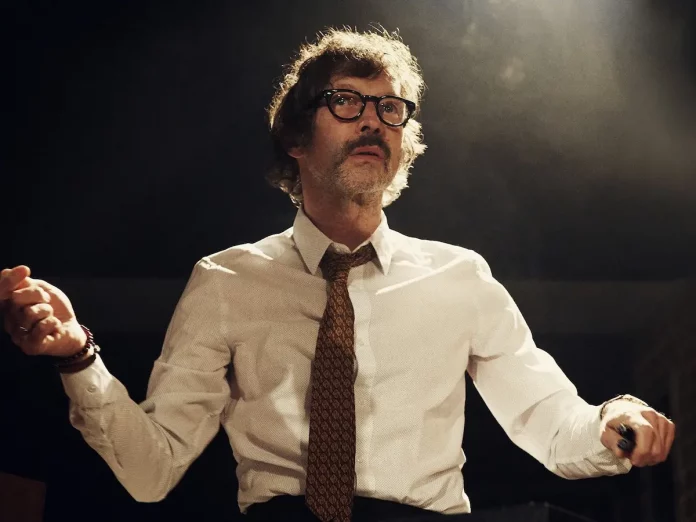Andreas Haddeland Trio: Estuar (Tare Records TARE04CD)
Much like the churning waters of the album’s title, Norwegian guitarist Andreas Haddeland’s music is a confluence of disparate currents. His expressive post-rock style assimilates the tonal and textural innovations of compatriots Terje Rypdal and Eivind Aarset, yet he is equally open to transatlantic influences including Nels Cline and Bill Frisell. A member of saxophonist Line Falkenberg‘s Line & The Lions and the rootsy folk-jazz ensemble Østerlide (visiting the Edinburgh Festival this August), this third release from his super-tight trio with Lars Tormod Jenset (b) and Ulrik Ibsen Thorsrud (d) marks something of a departure from the tightly drawn structures of previous works.
Recently experimenting with a more open and intuitive style of improvisation, Haddeland explained via e-mail: “Sometimes I might bring just a small motif to a rehearsal, and we might play with it for hours. Our concerts might sometimes be just one long flow, with a mix of open space and written tunes that are cued in.” You immediately sense these processes at work on Trirøding, its clean melodic line quickly disappearing into a choppy asymmetric groove. The driving blues-based Skrøne (a Norwegian word for a fabulist) teeters between free and swing-time, eliciting some furious three-way exchanges, while the slow-burning title track builds to an explosive crescendo. Silence and space reign supreme on Cumulus and Ysme (a kind of fog), both pieces suitably shape-shifting and amorphous. Striking a near perfect balance between freedom of expression and musical intelligence, Haddeland’s trio has come of age.
Simon Jermyn: Obsany (Elastic Records ER 018)
Another guitarist making waves is the Irish-born globetrotter Simon Jermyn, who also plays electric bass. Now relocated to Berlin after more than a decade in New York working with John Zorn, Chris Lightcap and Anna Webber amongst many others, he appears here with an all-European quartet featuring saxophonist Otis Sandsjö (Y-Otis), bassist and all-round musical catalyst Petter Eldh (Koma Saxo) and drummer Lukas Akintaya (HOLON Trio). Although very much rooted in the jazz tradition, the group’s richly coloured and genre-bending music assimilates numerous influences from the German capital’s many experimental music scenes.
The oud-like arabesques and looped strings of opener Phobos bring a moment’s tranquility before the darker and more menacing M-Base style grooves of New November come crashing in. The portentous theme of Bartok Sunroof Part I is shrouded in skirling electronics, while Bartok Sunroof takes a more laid-back foray into Laswell-esque ambient dub. Celestial Mechanics nods to Berlin’s thriving neo-classical scene, reminding me a little of Dictaphone, while Roche Limit draws on the city’s legendary glitch-electronica pioneers. Sandsjö shows great restraint as he caresses the soft melodic contours of Franklin J, and guest saxophonist Michaël Attias adds astringent but highly effective Dolphyisms to Party Shirt, frantic Prime Time-era Coleman licks to Teethy and a subtler Threadgill-esque whimsy to Teethy Coda. It’s testament to Berlin’s enduring position as a major creative hub, and Jermyn’s adventurous and unapologetically eclectic music is right at home there.
Johan Lindvall: End (Jazzland Recordings 3779691)
Listeners could be forgiven for feeling a little jaded by the sheer number of contemporary jazz piano trios, but the best exponents of this enduring sub-genre will always command my attention. Oslo-based Swede Johan Lindvall landed on my radar with his thoughtful contributions to saxophonist Mette Henriette’s recent ECM projects, leading me in turn to his freewheeling trio with Adrian Myhr (b) and Andreas Skår Winther (d). This is their third album, and just as with their previous releases the music is at once heavily improvised and meticulously composed. Sketchy outlines solidify as they play, and in a music largely free of cliché and nostalgia they’re as likely to borrow from the classical avant-garde or minimalist electronica as from the conventional rubric of jazz.
Each of the 11 pieces has a pithy one-word title which serves as a prompt for action, a variation perhaps on Eno’s oblique strategies. Stop immediately halted me in my tracks, its shimmering piano arpeggios and contra-rotating bass and drum patterns distilling the essence of The Necks into just three minutes. I’d defy anybody not to luxuriate in the rich melodic improvisation of Stay or to sit still during Dance, which brings an African feel via Jarrett. Chance pays homage to New York minimalism, the staccato patterns of Block and the stop-start flow of Read introduce an uneasy displacement, and as the dark overtones of End fade into the silence it’s as if we’re being invited to reflect on our own mortality. Another exemplary set from Lindvall’s world-class trio.
Web Web: Plexus Plexus (Compost Records CPT 653-1/-2/-3)
Roberto Di Gioia came to my attention fronting an exciting post-bop piano trio in the 90s. Since then the Italian-born keyboardist’s music has significantly diversified, and this eclectic German-based group was formed in 2016 after Di Gioia’s almost decade-long absence from jazz. It’s an outlet for his love of improvisation, acid-rock and Eastern-tinged psychedelia, his arsenal of vintage keyboards conjuring a staggering range of styles and sounds. For this, the group’s sixth album, the original line-up of Tony Lakatos (ts, f), Christian von Kaphengst (elb, kyb) and Peter Gall (d, kyb) is augmented by wildcard guest JJ Whitefield (elg), a player steeped in krautrock and funk. The result is a veritable musical bazaar.
The 14 short tracks were drawn from many hours of studio jamming and have been stitched together with the indubitable logic of a well-curated mix-tape. The musicians frequently swap instruments to vary the sound and the dynamics, but no matter how far they stretch one another the group maintains an incredible cohesion. Apotheosis, Nyx and The Argonaut’s Ensemble ride motoric Krautrock beats, the flute-led The Madness Of Ajax brings a more relaxed soul-jazz feel, Lakatos is magisterial on the Coltrane-esque ballad Sacred Tree, and it’s Alice Coltrane who springs to mind during the chants of Sha-Sa-Vish-Nu-Ka-Di. There’s a cool lounge-jazz cover of Moondog’s Bird’s Lament, Cheiron mines a deep Headhunters groove, while the Afro-beat cum Ethio-jazz of Sun-God would grace any dance-floor. Kosmische jazz has rarely sounded so good.




